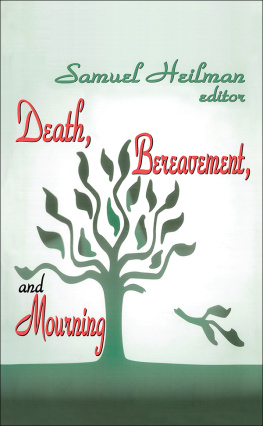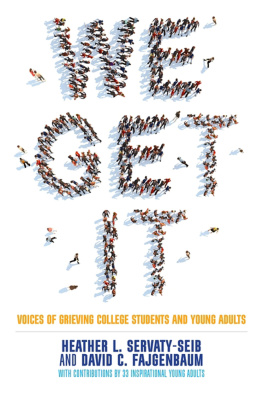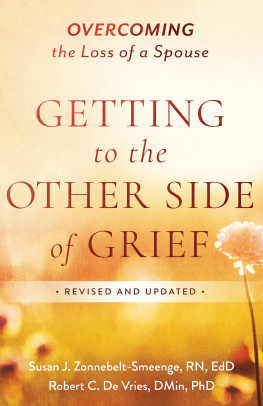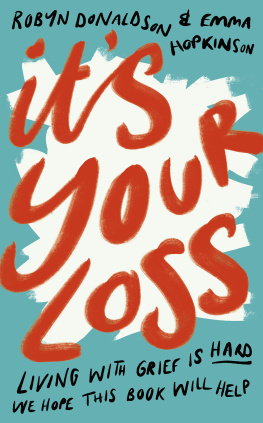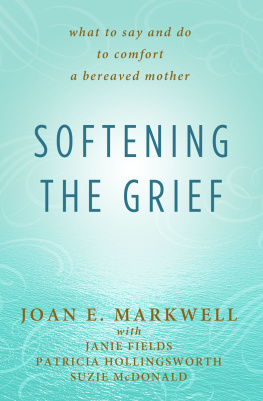The Loss of a Life Partner
The
Loss of a Life Partner
NARRATIVES OF THE BEREAVED
Carolyn Ambler Walter
COLUMBIA UNIVERSITY PRESS
NEW YORK
Columbia University Press
Publishers Since 1893
New York Chichester, West Sussex
E-ISBN 978-0-231-52934-1
2003 Columbia University Press
All rights reserved
cup.columbia.edu
Library of Congress Cataloging-in-Publication Data
Walter, Carolyn Ambler.
The loss of a life partner : narratives of the bereaved / Carolyn Ambler Walter.
p. cm.
Includes bibliographical references and index.
ISBN 0231119682 (alk. paper)ISBN 0231119690 (pbk. : alk. paper)
1. BereavementPsychological aspects. 2. DeathPsychological aspects. 3. Loss (Psychology) 4. Grief. I. Title.
BF575.G7 .W3435 2003
155.9'37dc21
2002031503
A Columbia University Press E-book.
CUP would be pleased to hear about your reading experience with this e-book at .
T his book is dedicated to my wonderful familyBruce, Kim, Brian, Steve, Matthew, David, Donna, Amy, Eric, and my late husband, John Walter, who provided the spirit for its inception and completion!
Contents
This book has been germinating for some time, and there are many whom I would like to thank for their contributions to its creation. First, this book would not have been written without the twenty-two partners who willingly shared their stories of the loss of a partner with me. Their stories and the creative ways in which they have constructed meaning from their experience of loss have helped to carry me forward in the completion of this work. I have tried to preserve the essence of what each partner shared with me, and I am grateful to all of them for their contributions to this book.
The idea for this book took root when I realized, during a workshop that I was giving on support groups for the loss of a young spouse, that there were no support groups for domestic partners. As I began to comb the literature, I realized that, other than Ken Dokas fine work on disenfranchised loss, this group had been neglected. Moved by my own experience of the loss of a spouse at a relatively young age, I sensed that my experiences in recovery did not match what I had learned about grief and loss in the earlier years of my education. I attended my first Association for Death Education and Counseling conference at the urging of one of my former students, Tony Griffith and, for the first time, heard the message that it is important to hold the memory of your partner in your thoughts and heart as you move forward in your new life. This is what the journey felt like to me, and I began to absorb the literature written by Klass, Silverman, and Nickman and by Robert Neimeyer for more ideas. I thank my colleague at the Center for Social Work Education, Dr. Alan Irving, for introducing me to John Michel, Executive Editor at Columbia University Press, who came to the Widener University campus for discussions with faculty who might want to write a book. John and I sat together and talked for two hours as we fleshed out the heart of the prospectus. John has been a support to me throughout the three years that I have worked on this book. I thank him for his help in keeping me going. Later, Enid Pearsons was invaluable as my copy editor.
I thank so many people, some of whose names I do not remember, for connecting me with bereaved partners who wanted to share their stories. The Samaritan Hospice in New Jerseyparticularly Tony Griffithwas very helpful in my quest, as was the Association of Death Education and Counseling, which offered to place an ad in its national newsletter. Camp Rehoboth was another source of help in locating bereaved partners. Jeffrey Kauffman helped me to locate contacts for possible partners to interview and discussed the beginnings of the book with me.
Many thanks to Widener University for granting me two Faculty Development Options Awards so that I could complete the work on this book. Provost Buck, Dean Wilhite, and Associate Dean Paula Silver were all helpful in the pursuit of release time. I thank all of you.
I am also appreciative of all of the typists (too many to mention) who worked to transcribe the interviews of the partners from the audiotapes. The staff at my husbands office has helped with so many different parts of this processI am most grateful to all of them! I would like to thank two graduate assistants, Diane Hall and Reinhild Boehme at the Center for Social Work Education at Widener University for helping me to comb the literature for material relating to the loss of a partner. Both of these graduate students went far beyond what I expected in helping me.
Finally, I am so appreciative of the wonderful support I have received from my family and friends (notably Janet Neer), but especially from my husband, Bruce, who married me while I was writing this book! My relationship with Bruce provides real proof that you can establish a wonderful, rich new relationship while transforming the relationship with your spouse who has died. Bruce has helped me with finding typists and with mailings of various parts of the manuscript, but most of all, by encouraging me to complete this work that has been so important to me.
Despite the growing number of books devoted to grief and loss, none integrate the literature about varying types of relationships and the bereavement experiences of partners in those relationships. This text juxtaposes the experiences of bereaved partners from marital relationships and those from domestic partnerships (same-sex and opposite-sex) in one work and examines the effects of both spousal loss and disenfranchised grief upon bereaved individuals.
The research on spousal loss is extensive and provides documentation showing that it can be the most stressful event in ones life (Holmes and Rahe 1967). What is far less extensive, however, is literature that examines the reactions of bereaved domestic partners. Here, we present and discuss excerpts of narratives of bereaved partners from widowed, same-sex, and opposite-sex relationships, based upon issues from the literature as well as from a postmodern perspective. This book provides the reader with a rare opportunity to explore the issues of partner loss in both traditional and nontraditional relationships. Socially sanctioned and disenfranchised grief are placed side by side, in an integrative manner, to validate the diverse types of grief that bereaved partners experience.
Because the number of adults choosing to live in nontraditional relationships is increasing, it is important to augment the literature that examines the issue of loss of a nonmarried partner. The most recent census report (Fields and Casper 2001) indicates that 7.6 million men and women responded to the census by indicating that they were living in a cohabiting relationship. This figure represents 3.8 million unmarried-partner households. According to the U.S. Census Bureau, These numbers may underrepresent the true number of cohabitating couples because only householders and their partners are tabulated, and respondents may be reluctant to classify themselves as such in an interview situation and describe themselves as roommates, housemates or friends not related to each other (Fields and Casper 2001:12). The increase in age at which both men and women are marrying has contributed to these statistics. For example, between 1970 and 2000, the number of women between twenty and twenty-four years of age who had not married doubled, and the proportion of women ages thirty to thirty-four years more than tripled. Similar dramatic shifts occurred for men.


